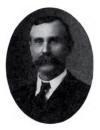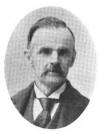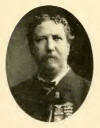|
Source:
Memoirs
of
Allegheny County, Pennsylvania
Personal and Genealogical
with Portraits
- Vol. II -
Madison, Wis.
Northwestern Historical Association
1904
(Click
Here to Return to Biographical Index)
 |
CLARENCE A. WALKER,
of McKeesport, Pa., health officer of that
city, was born in Westmoreland county, Pa.,
in 1853, and is a son of Jeremiah and
Olive Walker. He accompanied his
parents to Buena Vista, Allegheny county,
when quite young, and there attended the
public schools until sixteen years of age,
when he commenced to learn the painters‘
trade. He worked at that business for
two years at Boston, Pa.; then went to
Blairville, and there served out his
apprenticeship. Subsequently he
removed to Pittsburg, where he worked at his
trade for one year, and returning to Buena
Vista, went into business on his own
account. In 1878 Mr. Walker
located at McKeesport, and there continued
his business of painting, with some slight
interruptions, until 1902, when he was
elected to his present position of health
officer, and turned over his painting
establishment to his son, C. E. Walker.
Mr. Walker is a
prominent republican, and has occupied
several positions of importance in
connection with the municipal government.
He was appointed a school director to fill
the unexpired term of Florian
Smith, and at the expiration of that
term was elected to the same position from
the first ward. Subsequently he removed to
the third ward, and was the first water
commissioner of McKeesport, serving three
years in that important capacity, and being
re-elected for another three-year term.
Mr. Walker was married, in
1875, to Nancy J. Boyd, of Boyd's
Hollow, Pa., to whom were born four
children, Collomore E., Jennie, Olive
and Eliza, the last two named
deceased. Mr. Walker is a
member of the Masons, the Junior Order of
American Mechanics; also member of the
Woodmen of the World, and the Cumberland
Presbyterian church.
Source: Memoirs of Allegheny Co., Pennsylvania - Vol. II -
Publ. Northwestern Hist. Assn. - 1904 - Page
46 |
 |
HUSTON
QUAIL WALKER, of Pittsburg, Pa., a
prominent attorney, with offices in the
Bakewell building, was born in Clinton
township, Butler Co., Pa., on Tuesday, Nov.
4, 1862, son of William H. and Caroline
(McCafferty) Walker, the former born in
Butler county, Pa., and the latter at
Lewistown, Pa., and both now residing in
Butler county. Mr. Walker was
educated at Washington and Jefferson college
and by private tutors, and for a time taught
in the public schools of Butler. He
studied law in the offices of Judge
Mcjunckin and Judge Galbraith,
was admitted to the bar of Butler county,
May 25, 1891, and there practiced with much
success until January, 1895, when he removed
to Pittsburg, having been previously
admitted to the bar of Allegheny county in
December, 1894. Since then Mr.
Walker has continuously practiced at
Pittsburg, where he is a member of all
Pennsylvania and the United States district
and circuit courts. He has held the
position of a school director of
Wilkinsburg, where he resides, and is well
known throughout that section of the county.
He was married in Butler county, Pa., Sept.
5, 1888, to Margaret E. Bovard, and,
while they have no children, yet their home
life is a rarely happy one. Mr.
Walker and his wife are members of
the First Presbyterian church and are
prominently identified with its works of
charity and benevolence.
Source: Memoirs of Allegheny Co.,
Pennsylvania - Vol. I - Publ. Northwestern
Hist. Assn. - 1904 - Page 135 |
 |
JAMES WALKER,
a representative farmer of North Fayette
township, was born in Allegheny county in
1844. He is a son of James and Mary
(McGregor) Walker, both of whom were
natives of Allegheny county, where the
father followed the vocation of a farmer.
James Walker, Sr., was born in 1813
and died in 1895, having attained the age of
eighty two years. His wife died in
1850. Mr. Walker was
married a second time, to Julia
Ann Robinson, who survives him at
the age of eighty-four. James
Walker, Jr., in his boyhood and youth
lived the customary life of a farmer's son.
The summers were passed in aiding his father
to plant and harvest the crops, and in the
winter seasons he attended the common
schools of North Fayette township, where he
acquired a thorough knowledge of the common
branches. Mr. Walker
lived with his grandfather
McGregor until the latter's death in
1865, when he went to Pittsburg, and later
worked three years in a mill at Uniontown,
returning to his present home in 1877.
Mr. Walker has always
affiliated with the democratic party, though
he has never been an active participant in
political affairs, nor has ever aspired to
public office. He married late in
life, being united to Miss Ella A. Reed,
on May 26, 1897. She was born in 1859.
Both husband and wife are members of the
United Presbyterian church and consistently
practice the precepts of their religion in
their daily lives.
Source: Memoirs of Allegheny Co.,
Pennsylvania - Vol. II - Publ. Northwestern
Hist. Assn. - 1904 - Page 379 |
 |
JAMES DUNLAP WALKER, the
eldest son of William and Margaret
(Dunlap) Walker, an alderman of the
twentieth ward, Pittsburg, Pa.; a prominent
citizen and Civil war veteran, is one
of the best known and most highly respected
old soldiers in Pennsylvania.
He was born in Allegheny city, Pa.
June 6, 1846, and attended public and
private schools there, afterwards completinghis education at the Iron City
business college, returning his test papers
and enlisting for the war on the same
day. In August, 1862, he enlisted as a
private in Company B,
15th Pennsylvania volunteer infantry, and
served about two
months, taking part in the battle of
Antietam, and also in the
pursuit and capture of the daring
confederate general, John Morgan, by
Shackelford's cavalry. He then
enlisted in the famous Knap's Pennsylvania
battery for three years, or during the
war, and from the date of enlistment
participated in all the marches
and battles of that celebrated organization
until mustered out at
the age of nineteen, in Pittsburg, June 14,
1865. In an hour and
a half of fierce fighting at Wauhatchie,
Tenn., with four guns in
action, the battery lost twenty-six men
killed and wounded out of
forty-six officers and men engaged, and of
forty-eight battery
horses which went into the engagement, all
but two were disabled.
At the battle of Pine Mountain, Ga. , this
battery fired the shot
which killed General Polk, known as the
"bishop-general" of the
confederacy. The organization was with
General Sherman in his
famous march to the sea and through the
Carolinas and is spoken
of in his memoirs as the "famous battery."
Colonel Walker was
taken prisoner near Blackwater, N. C, by
General Hampton's confederate
cavalry, and confined in the confederate
prisons at
Raleigh, N. C, and at Danville, and later
spent some time in the
noted Libby prison at Richmond. After the
war Colonel Walker spent two years in the west working at his
trade of bricklaying,
and then, returning home, engaged in the
business of general
contracting, in partnership with his father,
up to 1879, afterwards
continuing the business alone until 1894. In
1886 he removed to
the city of Pittsburg, and, in 1898, was
appointed an alderman by Governor Stone to fill a vacancy, being
elected to the same position
at the next general election for a term of
five years. Colonel
Walker has been a member of the G. A. R.
since 1867; is a past
commander of Post No. 88, department of
Pennsylvania, G. A. R.;
served four terms as president of the
Allegheny county association
of Union ex-prisoners of war, and is a past
president of the Allegheny
G. A. R. association. He was for three terms
chairman of
the executive committee of the Union
ex-prisoners of war, and
was elected national commander of that
organization in 1901, and
re-elected in 1902 and 1903. At present he
is commander of Knap's battery veteran association. He
served in the Pennsylvania
State legislature from 1876 to 1881, and as
an officer of the
National guard and chairman of the military
committee of the
Pennsylvania house of representatives for
three sessions, was
very active and successful in securing
legislation looking to the
betterment of the condition of the old
soldiers and soldiers'
orphans, and the reorganization of the
Pennsylvania national
guard. A deserved compliment in recognition
of his services at
that time was his appointment by Gov. Henry
M. Hoyt to the
position of chief of artillery, with the
rank of colonel, in which position he served four years. He is now
superintendent of erection
of the Andersonville State military
commission, which plans to
erect a monument to the 1,849 Pennsylvania
soldiers who died in
Andersonville confederate prison and are
buried in the national
cemetery at Andersonville, Ga. Colonel
Walker is a member of
the B. P. O. E., Americus club, and other
fraternal societies. He
is of Scotch-Irish extraction, and of
direct descent from the fighting
preacher of the "Walls of Derry.
Source: Memoirs of Allegheny Co.,
Pennsylvania - Vol. I - Publ. Northwestern
Hist. Assn. - 1904 - Page 71 |
|
(no portrait) |
JOHN
J. WALKER, justice of the peace of
Allegheny county, with headquarters at No.
911 Wood St., Wilkinsburg, has held that
position since 1871, and is the oldest
justice in continuous commission in
Allegheny county. He was born in the
third ward, Allegheny city, Pa., Feb. 1,
1841, was reared there and attended its
schools, studying also at Mercer academy,
Mercer, Pa., and at the Western university.
He left school when sixteen years old,
working as a painter in Allegheny city and
Philadelphia. On Apr. 17, 1861, he
enlisted as a private in Company E, 7th
Pennsylvania volunteer infantry and was one
of the first to take up arms for his country
against the rebels. Mr.
Walker served his three months with this
regiment, then returned to Allegheny city
and engaged for a short time in the painting
business. In September, 1861, he began
to raise a company of artillery, which
afterwards became Company C, 2d Pennsylvania
heavy artillery. Mr. Walker
was first lieutenant of the company
until March, 1862, when he resigned and
returned for a time to his business.
Unable to remain away from duty, he
re-enlisted in August, 1862, as a private in
Company G, 139th regiment, Pennsylvania
volunteer infantry. He served until
Dec. 15, 1864, rising to the position of
corporal. He then was commissioned captain
of artillery in the regular army and served
by order of Mr. Stanton,
secretary of war, on detailed duty in
Georgia and Tennessee until Dec. 9, 1866,
when he resigned and came home. During
the war Mr. Walker fought at
second Bull Run, Fredericksburg,
Chancellorsville, Mary's Heights, second
Chancellorsville, Gettysburg (three days),
Mine Run, Savage Station, the Wilderness,
Winchester, Petersburg and Sailor's Creek.
In the Wilderness he was wounded and for six
weeks prevented from active service.
He was at Petersburg from July, 1864, to
February, 1865. The war over, Mr,
Walker resumed his painting business
in Wilkinsburg and was thus engaged until
1879, when he became assistant in the office
of the clerk of courts, in Pittsburg.
He remained there until 1885, then became
clerk in the office of the county treasurer
for one year, and in 1888 was elected jury
commissioner, serving three years.
Mr. Walker has since that time
devoted his attention to his business as
justice of the peace and has not held other
offices, although still taking an active
part in republican politics. He is a
member of Post No. 548, G. A. R.; B. P. O.
E., I. O. O. F., K. of P., and Jr. O. U. A.
M. He is past grand master of the Odd
Fellows and Knights of Pythias, and is a
member of the Methodist Episcopal church.
Source: Memoirs of Allegheny Co.,
Pennsylvania - Vol. I - Publ. Northwestern
Hist. Assn. - 1904 - Page 452 |
|